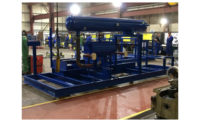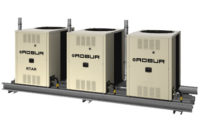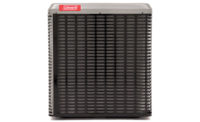For the next 20 years, with heat from 1952 oil space heaters, Lindberg kept five guest cabins open year-round. But with the rising cost of heating oil, he began to look for ways to cut his energy costs. He was spending over $20,000 a year on utility costs alone. He started by making the cabins more energy-efficient and added insulation, new windows, and doors.
Yet heating oil was still his greatest expense. In the peak of winter, for the seven cottages, he was spending $1,000 for oil every three weeks. In 2006, one of Lindberg’s neighbors built a home for elder care and installed a variable refrigerant flow (VRF) zoning system in it. Impressed by its energy-efficient performance and super quiet operation, Lindberg contacted Mitsubishi dealer Berger & King Inc. in nearby Escanaba, Mich.
Aaron Berger, residential sales manager, and HVAC consultant Andy Senti, Tem Tek LLC (Lake Mills, Wis.), told Lindberg about the new Mitsubishi Electric split-ductless heat pump system designed for northern climates with extremely cold winters.
Berger explained that the equipment is Energy Star® rated and qualifies for residential tax credits. The outdoor units are rated at 22 SEER and operate as low as 56 dB(A). The indoor units operate as low as 22 dB(A), which is especially beneficial for hospitality installations. The system operates at 92 percent of its rated heating capacity at 5˚F.
Impressed, Lindberg was also pleased that the Mitsubishi Electric units would deliver comfortable cooling solutions for hot and humid summer months. “The cottages have never been air conditioned,” he said. “We know that air conditioning will bring us higher traffic in the summer — especially from our female guests.”
Senti explained that the system’s inverter-driven compressor has a dry mode feature for humidity control that is key to comfort for the cooling months. The dry mode keeps the indoor coil temperature around 40˚ while reducing the fan speed to maintain the set temperature and dry out the space.
Lindberg gave Berger approval to install a Mitsubishi Electric split-ductless system in each cottage. Berger installed seven MUZ-FD outdoor units and seven MSZ-FD indoor units, and Lindberg has been pleased with the results.
“The summer months were a pleasant surprise,” he said. “We heard from all our old customers complimenting us on the indoor comfort and quiet.” Then, in January 2010, temperatures dropped to -10˚. But when Lindberg checked his cabin interiors, every one held a temperature of 65˚, just where he had set them. And Lindberg added, “My January per cabin heating cost was cut in half.”
Publication date: 12/26/2011











